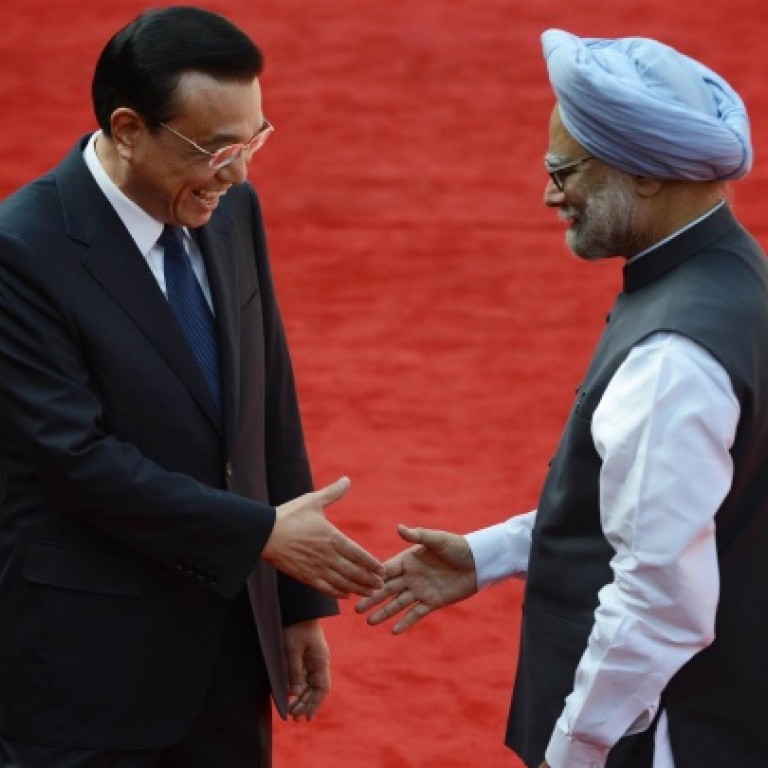
Li Keqiang vows to end border disputes as he visits New Delhi
Premier and his counterpart Manmohan Singh will seek to resolve long-running disputes and draw up strategy for 'dynamic balance' in trade
China and India agreed on Monday to launch a fresh round of talks to settle their long-running border disputes.
They also pledged to draw up a roadmap to reach a "dynamic balance" in trade between the two emerging economic powers.
We need to improve the border mechanisms...and make them more efficient
The announcements were made after Premier Li Keqiang held talks with officials including his counterpart Dr Manmohan Singh in New Delhi.
The two leaders said they viewed each other as "partners with mutual benefits rather than rivals or competitors".
They also witnessed the signing of eight co-operative deals covering areas including agriculture, water resources and sewage management.
A three-week border stand-off in the Depsang Valley in the Ladakh region had threatened to overshadow Li's visit, with India accusing Chinese troops of trespassing into its territory.
Beijing and New Delhi have held 15 rounds of talks to resolve the border issues, but made little headway. Singh said that "peace and tranquility" on the borders was the basis for the growth of bilateral ties.
He said: "We agreed that our special representatives will meet soon to continue discussions seeking an early agreement on a framework for a fair, reasonable and mutually acceptable boundary agreement."
Li said the border dispute was a historical hangover and there was a desire on both sides to resolve it. "We have established the principles for settling the question," Li said.
"Both sides believe that we need to improve the border mechanisms that have been put into place and make them more efficient … and appropriately resolve our differences."
On the economic front, the two sides pledged to realise a trade turnover target of US$100 billion by 2015 and address a trade imbalance which has dismayed New Delhi. India ran a US$29 billion trade deficit with China last year and the measures include stronger Chinese co-operation with India's pharmaceuticals and information technology industry.
Li said: "The two sides will discuss and explore ways to achieve trade and investment liberalisation and facilitation … and to work out a practical road map for achieving a dynamic balance in our trading relationship."
A joint statement issued by the two nations said they would explore the development of an economic corridor that would link Bangladesh, China, India and Myanmar, and co-operate on establishing industrial zones.
Li dismissed fears China was seeking to contain India by shoring up close ties with other South Asian countries such as Pakistan.
In an article headlined "Handshake across the Himalayas" in newspaper, Li said the emerging giants could together become a new engine for the world economy.
"World peace and regional stability cannot be a reality without strategic mutual trust between India and China," Li said in a speech at India's presidential palace yesterday. "And likewise, the development and prosperity of the world cannot be a reality without the co-operation and simultaneous development of China and India."
On Tuesday morning, he met about 200 Chinese people living in New Delhi.
Li told them China's economic targets could still be achieved if its average economic growth rate was 6.9 per cent a year.
The premier noted that while China's high economic growth rate of 7.7 per cent in the first quarter had sparked concern, it was within expectations.
He said the risk of an economic downturn in China still existed, but preventative measures would be taken.
Li also said the government would avoid intervening and let market forces operate.
During his speech to the Chinese community, Li stressed that Sino-Indian diplomatic ties were at a critical stage - although relations had generally been stable in recent years.
Li said India and China were unique nations - whose global and economic influence could not be ignored.
He said both countries had to accommodate each others’ concerns.
On a lighter note, Li said many Chinese enjoyed Bollywood films and Yoga, while many Indians admired kung fu.
He did not take questions from the floor during the speech.
Li leaves New Delhi on Tuesday for the country's financial hub Mumbai, where he will meet business leaders.


